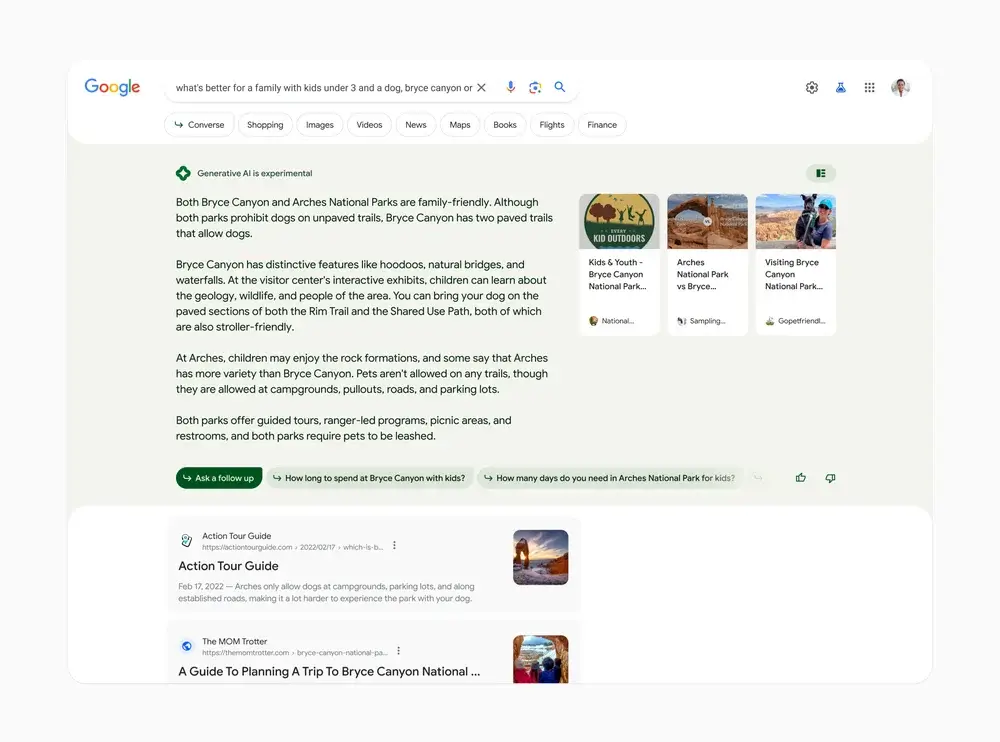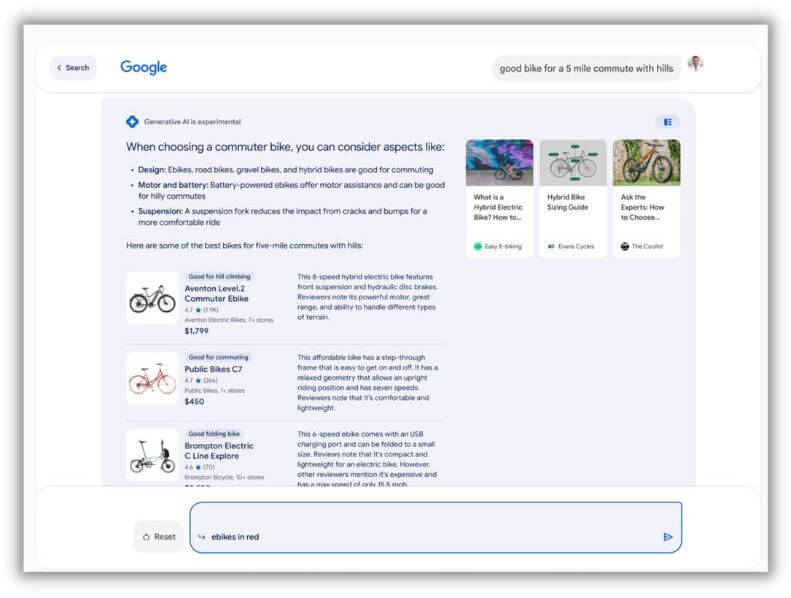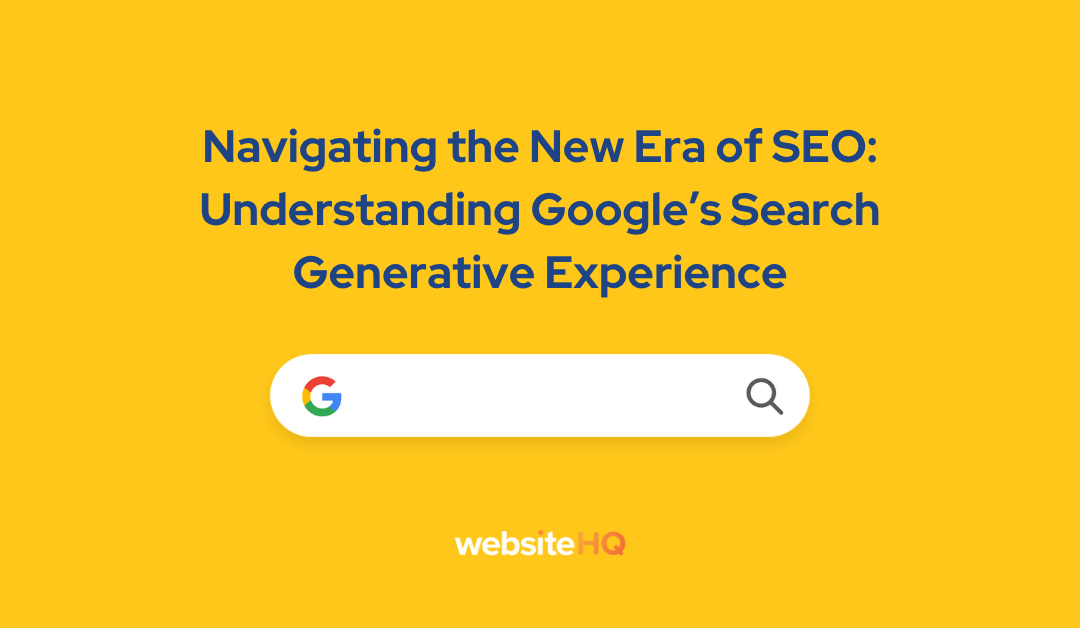In the ever-evolving digital marketing world, staying ahead of the curve is crucial for success. One of the latest developments that has been making waves in the SEO community is Google's Search Generative Experience (SGE). This innovative feature, powered by artificial intelligence (AI), is set to redefine how we interact with search engines.
SGE is an experimental version of Google's search engine that uses AI to generate contextual answers to complex queries. It aims to provide users with more precise and comprehensive search results, enhancing the overall search experience. However, as with any significant change in the digital space, SGE has raised questions and concerns among marketers and SEO professionals.
Introducing AI-generated responses in search results could impact how we approach SEO. It might alter how we optimize content, use keywords, and strategize for organic and paid traffic. This article aims to delve into the intricacies of Google's SGE and its implications for SEO. We will explore what SGE is, how it works, and how it might shape the future of SEO. So, whether you're an SEO expert, a digital marketer, or a business owner, read on to discover how to navigate this new era of SEO.
Understanding Google's Search Generative Experience
Google's Search Generative Experience (SGE) is a groundbreaking feature that leverages the power of artificial intelligence to enhance the user's search experience. It's an experimental version of Google's search engine designed to provide more accurate and contextually relevant answers to complex queries.
At its core, SGE uses AI to generate what Google calls a “snapshot” – a unique summary for longer queries. This snapshot is designed to provide a brief yet comprehensive answer to complex, multi-angle questions. For instance, if you were to ask, “What's the best restaurant for a family with peanut allergies near the Empire State Building that doesn't have a long wait?” SGE would generate a unique response by drawing information from several sources at once.
Another key feature of SGE is its “Conversational Mode.” This feature answers follow-up questions while retaining the context of the original search. So, for example, if you ask, “Why do whales like to sing?” and follow up with “plush ones for kids under $40,” SGE would understand that you're looking for plush whale toys for children and provide relevant results accordingly.

The third way SGE uses AI to enhance the search experience is through “Vertical Experiences.” This feature provides a preferred list of features and more product details in commercial searches. For instance, if you're searching for a bike suitable for a five-mile, hilly commute, SGE would understand these parameters and provide a list of relevant products, complete with AI-generated descriptions, reviews, prices, and availability.

While these features are designed to help users find better answers faster, they also serve a secondary purpose – to encourage the exploration of online content.
Google has made it clear that its focus remains on driving attention to web content.
It is a hopeful sign for businesses that rely on paid or organic search traffic, as it suggests that SGE is not intended to replace the need for users to visit websites but rather to enhance the search experience and guide users toward relevant content. As we delve deeper into the implications of SGE for SEO, it's important to keep these key features in mind.
Implications of SGE for SEO
The advent of Google's Search Generative Experience (SGE) presents new challenges and opportunities for SEO professionals. As SGE reshapes the search landscape, it's crucial to understand its potential impact on organic traffic, content optimization, keyword strategies, and paid ads.
One of the primary concerns among SEO professionals is the potential change in organic traffic. The AI snapshot feature in SGE, which provides a brief answer to complex queries, occupies a significant portion of the search results page. This could reduce the visibility of the traditional “10 blue links”, leading to decreased organic traffic. However, Google has stated that it remains committed to driving traffic to websites, suggesting that the impact on organic traffic might not be as severe as initially feared.
The introduction of SGE also underscores the importance of high-quality content. Google's AI draws from multiple sources to generate its snapshots, emphasizing the need for accurate, reliable, and comprehensive content. This aligns with Google's E-E-A-T (Experience, Expertise, Authoritativeness, Trustworthiness) guidelines, reinforcing the importance of creating content that builds credibility for your site.
Long-tail keywords, which are more specific and often less competitive than short, generic keywords, are likely to gain even more importance in the SGE era. The conversational mode in SGE encourages users to ask complex, multi-angle questions, which often resemble long-tail keywords. Optimizing content for these types of queries could drive more qualified traffic to your site.
On the paid side, SGE could also impact the performance of search ads. Google has stated that ads will continue to appear in dedicated slots throughout the search results page. However, introducing AI-generated snapshots and product suggestions could change how users interact with ads. As a result, advertisers might need to adjust their strategies to ensure their ads remain effective in this new search environment.
The key lies in embracing and leveraging the change to enhance visibility, drive traffic, and, ultimately, achieve your business goals.
SGE and Google One Premium
As Google continues innovating and enhancing its search experience, it also offers unique benefits to its Google One Premium subscribers. One benefit is priority access to the Search Labs and the new Search Generative Experience (SGE).
Google One is a subscription plan that offers expanded cloud storage and additional benefits across Google's suite of products. The Premium tier, which offers 2 TB or more storage, also includes 10% back in the Google Store and extra Google Workspace features. As of the writing of this article, Google One Premium subscribers are being offered priority access to the Search Labs waitlist.
While this doesn't guarantee immediate access to SGE, it does place Premium subscribers at the front of the line as more spots become available. This priority access could provide businesses and SEO professionals with an early look at the new search experience, allowing them to adapt their strategies ahead of the broader rollout.
This move also hints at Google's potential future direction. Integrating premium AI features into a subscription model could signify things to come. While the core AI features in Google Search will remain free, given the search engine model, more advanced features could eventually be tied to a subscription.
The Future of SEO in the Age of SGE
As we look toward the future of SEO in the age of Google's Search Generative Experience (SGE), it's clear that change is on the horizon. However, rather than viewing this as a threat, seeing it as an opportunity for growth and evolution is essential.
Despite the advancements in AI and the introduction of features like AI snapshots and conversational mode, human-generated content remains paramount. Google has acknowledged this, stating that people prefer content written by humans, especially when making purchase decisions. This underscores the continued relevance of SEO and the need for high-quality, human-written content.
The introduction of SGE could lead to higher conversion rates for both SEO and paid traffic. The AI-powered snapshots and product suggestions provided by SGE can help users refine their search before clicking on a link. This means that by the time a user reaches your site, they are likely to be a higher intent buyer, which could lead to higher conversion rates.
In terms of content optimization, AI can be a valuable tool. For example, AI-powered tools like Surfer AI can help optimize content writing, making it more effective and efficient. Of course, this doesn't mean AI will replace human content creators. Still, it can enhance their work, providing insights and suggestions to improve content quality and relevance.
On the paid side, advertisers will need to adapt to the changes brought about by SGE. This could involve making adjustments to ad placements and strategies to ensure that ads remain effective in the new search environment.
Preparing for SGE
As Google's Search Generative Experience (SGE) begins to reshape the search landscape, businesses and SEO professionals must prepare for this new era. Here are some steps you can take to adapt to SGE:
- Stay Informed: Keep up-to-date on the latest developments and updates from Google. Understanding how SGE works and evolves will help you adapt your SEO strategies accordingly.
- Focus on Quality Content: Despite the advancements in AI, the importance of high-quality, human-generated content remains paramount. Continue to create content that provides value to your audience and aligns with Google's E-E-A-T (Experience, Expertise, Authoritativeness, Trustworthiness) guidelines.
- Optimize for Long-Tail Keywords: With SGE's conversational mode encouraging users to ask complex, multi-angle questions, optimizing content for long-tail keywords could drive more qualified traffic to your site.
- Leverage AI Tools: AI-powered tools can help optimize content writing, making it more effective and efficient. Consider using tools like Chat GPT, Google's Bard, and jasper.ai to enhance your content creation process.
- Adapt Paid Strategies: If you're using paid ads, be prepared to adjust your strategies to ensure your ads remain effective in the new search environment.
Embracing these changes and preparing for the future of SEO will help ensure your business thrives in the digital landscape.
Conclusion
The introduction of Google's Search Generative Experience (SGE) marks a significant milestone in the evolution of search engines. While it presents new challenges for SEO, it also opens up exciting opportunities for those willing to adapt and innovate. As we navigate this new era, the importance of high-quality, human-generated content remains paramount. Leveraging AI tools can enhance content creation, and adapting strategies for long-tail keywords and paid ads can drive more qualified traffic. As we look towards the future, embracing these changes and staying informed will be vital to thriving in the ever-evolving landscape of SEO.



